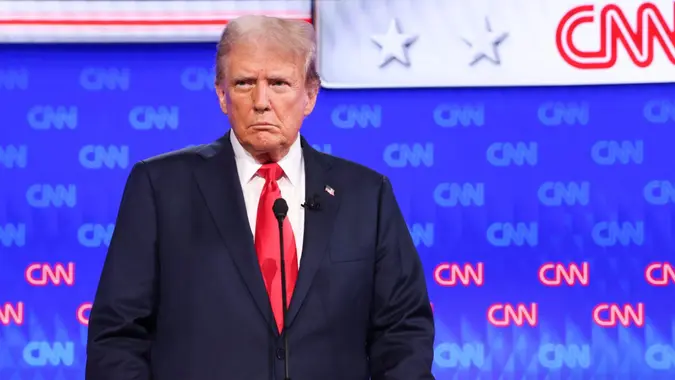5 Things That Can Happen to Medicaid If Trump Wins the Election

Commitment to Our Readers
GOBankingRates' editorial team is committed to bringing you unbiased reviews and information. We use data-driven methodologies to evaluate financial products and services - our reviews and ratings are not influenced by advertisers. You can read more about our editorial guidelines and our products and services review methodology.

20 Years
Helping You Live Richer

Reviewed
by Experts

Trusted by
Millions of Readers
Medicaid was signed into law in 1965 alongside Medicare as part of a wide effort by then-President Lyndon B. Johnson’s administration to get people out of poverty and to prevent people from slipping into it. The health coverage program for low-income people, which provides low-cost or free medical coverage, is available nationwide, as is CHIP, which is the same, but for kids, providing coverage to those in low-income households who meet the financial requirements.
As of March 2024, 82,751,338 individuals were enrolled in Medicaid and CHIP in the U.S. To break that down: 75,645,578 individuals were enrolled in Medicaid and 7,105,760 individuals were enrolled in CHIP.
Where does the future of Medicaid stand? Its immediate future hinges partly on who becomes the 47th president of the U.S. in 2025.
Josh Thompson, CEO at Impact Health USA, spoke with GOBankingRates about how a second term for Trump could change Medicaid.
Work Requirements
In his first term, Trump made efforts to implement work requirements for Medicaid recipients — but was met head-on with legal challenges that blocked these efforts. It’s quite possible that during a second term, Trump would make more attempts to make work requirements necessary for Medicaid recipients.
“These requirements could reduce enrollment among vulnerable populations, impacting those who rely on Medicaid the most,” Thompson said.
Block Grants and State Control
We could see Trump fight for block grants, which would give individual states more control over Medicaid funds.
“This could lead to varied benefits and coverage across states, depending on how each state manages its allocation,” Thompson said. “While some states might innovate effectively, others could struggle to maintain comprehensive coverage.”
Cost Reduction Strategies
Trump has made efforts to reduce federal spending on Medicaid, and we could see those efforts continue, “possibly through tighter eligibility requirements and administrative changes,” Thompson said. “This might result in fewer people qualifying for Medicaid or reduced benefits for those who do.”
Ease of Use and Technological Integration
One way in which Trump’s policies could enhance Medicaid is by executing initiatives to streamline Medicaid processes at the state level, “making it easier for beneficiaries to access and manage their benefits through improved digital platforms,” Thompson said.
Tax Implications
Potential tax cuts under Trump could impact federal funding for Medicaid. Thompson said this will lead to tighter budgets and “potentially reduced services or increased cost-sharing for recipients. This could strain the program’s ability to provide adequate coverage.”
Stay Prepared – and Informed
The bottom line: “Under Trump, Medicaid could see significant changes aimed at reducing federal involvement and spending,” Thompson said. “Beneficiaries should stay informed about state-level changes and prepare for potential shifts in eligibility and benefits.”
Editor’s note on election coverage: GOBankingRates is nonpartisan and strives to cover all aspects of the economy objectively and present balanced reports on politically focused finance stories. You can find more coverage of this topic on GOBankingRates.com.
 Written by
Written by  Edited by
Edited by 

























